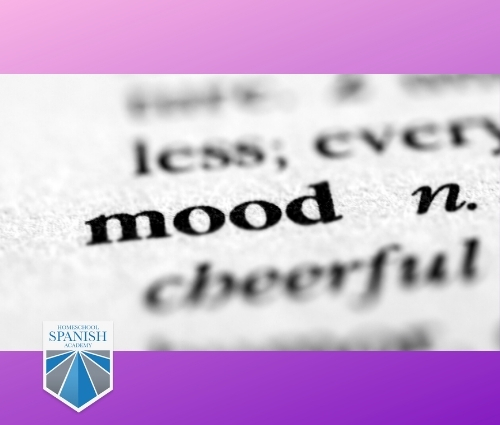
How to Talk About Your Mood in Spanish
What are you in the mood for?
Spanish is known for being expressive, warm, and passionate. The language offers a variety of ways to talk about our emotions (las emociones) and feelings (los sentimientos). Learn more about expressing feelings and emotions in Spanish.
To clarify, this post is not about the subjunctive mood (el modo subjuntivo) in Spanish. If you’re looking to study the subjunctive, check out these posts:
- Subjunctive Spanish Conversations: Examples and Exercises
- Subjunctive Spanish Endings for -AR Verbs in Every Tense
- Common Ways to Use the Spanish Subjunctive to Enhance Conversation
Today, we’re actually learning some useful vocabulary to talk about our mood in Spanish!
Emotions, Feelings, and Moods: What’s the Difference?
Emotions are chemicals released in the brain and body in response to our interpretation of a specific trigger. It takes the human brain a second to identify the trigger and produce the chemicals. Emotions typically last for just six seconds!
Feelings happen as we begin to integrate, think about, and “process” the emotion. In both English and Spanish, we “feel” both physical and emotional sensations. Our feelings are something we sense. Feelings tend to be fueled by a mix of emotions and last longer than emotions.
Lastly, and most important for this post, our moods are the more generalized result of a collection of inputs. Mood is influenced by factors like the weather, the people around us, our diet, fitness level, and our mental state (our current emotions and feelings). Moods can last minutes, hours, or even days.

The word “mood” in English translates into Spanish in various ways. The most formal phrases are el estado anímico and la disposición de ánimo. However, you’re most likely to hear el humor to refer to someone’s mood, humor, spirit, or temper. Two other, less common translations for mood are:
- el modo – mode, way, manner
- el capricho – whim, caprice, fancy
Check out these phrases and example sentences that use the word mood in Spanish.
in a bad mood – de mal humor
Un paseo largo puede combatir el mal humor. – A long walk can beat a bad mood.
¡Cuidado con la profesora! Ella está de mal humor. – Be careful with the teacher! She’s in a bad mood.
in a good mood – de buen humor
Pedro está siempre de buen humor. – Pedro is always in a good mood.
Siempre que está de buen humor, paga la cuenta. – He always pays the bill when he is in a good mood.
in the mood – con ánimo de, de humor, tener ganas
¿Estás con ánimo de nadar? – Are you in the mood to swim?
El maestro no está de humor para lidiar con más errores. – The teacher is in no mood to deal with any more mistakes.
Tengo ganas de comida japonesa. – I’m in the mood for Japanese food.
mood disorder – trastorno del estado de ánimo
Lidia tiene un trastorno del estado de ánimo. – Lidia has a mood disorder.
mood swing – cambio de humor
¿Por qué tuviste un cambio de humor? – Why did you have a mood swing?
sense of humor – sentido del humor
Él aparenta no tener sentido del humor. – He seems not to have a sense of humor.
dark humor – humor negro
La película tenía un toque de humor negro. – The movie had a touch of dark humor.
Mood in Spanish: Vocabulary Words
Our vocabulary for moods has become quite vast, especially in the past decade, thanks to the popularity of social media. Basic adjectives like happy, sad, and nervous are hardly adequate to describe one’s mood anymore. In fact, many internet users post evocative GIFs or memes to explain their mood through visual imagery on Facebook, Instagram, and other social media networks.
We’re keeping it old school for now, though. Here’s a list of over 70 good, old-fashioned mood words!
| English | Spanish |
| Accomplished | Consumado |
| Amused | Divertido |
| Angry | Enojado |
| Annoyed | Irritado |
| Anxious | Ansioso |
| Apathetic | Apático |
| Awake | Despierto |
| Blissful | Feliz |
| Cheerful | Alegre |
| Crazy | Loco |
| Crushed | Aplastada |
| Curious | Curioso |
| Cynical | Cínico |
| Depressed | Deprimido |
| Disappointed | Decepcionado |
| Discontent | Descontento |
| Drained | Agotado |
| Ecstatic | Extático |
| Energetic | Energético |
| Enthralled | Cautivado |
| Envious | Envidioso |
| Excited | Emocionado |
| Exhausted | Agotado |
| Flirty | Coqueta |
| Frustrated | Frustrado |
| Giggly | Risueño |
| Gloomy | Melancólico |
| Good | Bueno |
| Grateful | Agradecido |
| Groggy | Mareado |
| Grumpy | Gruñón |
| Happy | Contento |
| Hopeful | Esperanzado |
| Hungry | Hambriento |
| Hyper | Hiper |
| Impressed | Impresionado |
| Indifferent | Indiferente |
| Infuriated | Enfurecido |
| Irate | Airado |
| Jealous | Celoso |
| Lazy | Perezoso |
| Lethargic | Letárgico |
| Lonely | Solitario |
| Loved | Amado |
| Mad | Enojado |
| Melancholy | Melancolía |
| Mellow | Meloso |
| Moody | Temperamental |
| Morose | Taciturno |
| Naughty | Travieso |
| Numb | Entumecido |
| Okay | Bueno |
| Optimistic | Optimista |
| Peaceful | Pacífico |
| Pessimistic | Pesimista |
| Pleased | Satisfecho |
| Refreshed | Actualizado |
| Rejected | Rechazado |
| Rejuvenated | Rejuvenecido |
| Relaxed | Relajado |
| Relieved | Aliviado |
| Restless | Inquieto |
| Sad | Triste |
| Sick | Enfermo |
| Silly | Tonto |
| Sleepy | Soñoliento |
| Smart | Inteligente |
| Stressed | Estresado |
| Surprised | Sorprendido |
| Thankful | Agradecido |
| Tired | Cansado |
| Uncomfortable | Incómodo |
| Weird | Extraño |
Mood in Spanish: More Example Questions and Statements
¿Estás enojado(a)? – Are you angry?
Sí, estoy molesto – Yes, I am angry.
No, no estoy molesto – No, I am not angry.
¿Estás asustado(a)? – Are you scared?
You can use this format for almost any emotion:
Question: ¿Estás _____ ?
Answer: Sí, estoy ______ or No, no estoy ______ (OR) Sí, lo estoy (Yes, I am) or No, no lo estoy (No, I’m not).
¿Cómo te sientes? – How do you feel?
¿Cómo estás? – How are you?
¿Cómo andas? – How are you doing?
¿Te sientes ________? – Do you feel ________? (Use any word from the list above to describe your mood.)
¿Qué te pasa? / ¿Qué te sucede? – What’s wrong (with you)?
No me pasa nada. – Nothing is wrong.
Me siento mal. – I feel bad.
No estoy de humor para esto ahora mismo, en serio. – I’m not in the mood for this right now, seriously.
No tengo ganas de escuchar tu problema. – I’m not in the mood to hear about your problem.
¿Qué te enoja? – What makes you mad?
¿Qué te hace feliz? – What makes you happy?
¿Qué estados de ánimo experimentas con más frecuencia? – What moods do you experience most often?
¿Cuándo fue la última vez que fuiste sorprendido? – When was the last time you were surprised?
¿Cuándo fue la última vez que estuviste asustado? – When was the last time you were scared?
In the Mood to Learn?
Are you in the mood to speak Spanish with a native speaker? Sign up for a free trial class today.
What other words or phrases do you use to express your mood in Spanish? Share it with me in the comments!
Want more free Spanish resources? Check out these posts!
- 100 Easy Spanish Words for True Beginners
- Language Learning with Netflix: How to Use the Chrome Extension
- Earth Day Projects for Kids + Spanish Earth Day Vocabulary
- Turn Your Life Around: From Passive Bilingualism to Fluency!
- 23 Common Spanish Prepositions You Can Use Today
- 25 Common Subjunctive Phrases in Spanish Conversation
- 10 Homeschooling Styles You Need to Explore in 2023
- What Is an Infinitive in Spanish?
- 10 Innovative Contemporary Latin American Artists Who Broke the Mold - February 16, 2023
- The Sweetest Guide to Valentine’s Day Vocabulary in Spanish - February 14, 2023
- 10 Famous Afro-Latinas Who’ve Made a Powerful Impact - February 9, 2023





